‘Supporting Education, Resisting the Blockade,’ TUC Congress fringe meeting
Campaign News | Wednesday, 19 October 2022
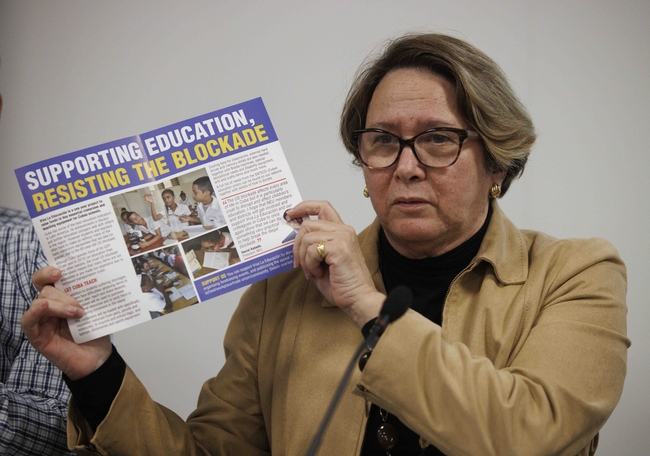
Her Excellency Bárbara Montalvo Álvarez, (photo credit Mark Thomas)
CSC and the National Education union held a successful joint fringe at the rescheduled TUC Congress on Tuesday 18 October. ‘Supporting Education, Resisting the Blockade,’ looked at Cuba’s achievements in education in the face of a 60 year old blockade, the importance of international solidarity both practical and political, and the progress of the Viva La Educación appeal which is raising money to send educational aid to Cuban schools in 2023.
Chairing the meeting, CSC director Rob Miller thanked all the unions that had donated to the appeal which had raised more than £52,000 since its launch earlier this year.
One of the unions to have donated is ASLEF, and John Metcalfe, an executive council member from the union was the first to address the meeting of more than 80 TUC delegates at the Brighton Centre.
John had been part of the CSC May Day Study Tour to Cuba in 2022 and spoke of what he had seen on the visit. He said that the union knew from it’s meetings with Cuban workers how “the US blockade prevents Cuba from developing to its full potential and caused severe hardships for the Cuban people.
“This is why we are also pleased to support and make a donation to the Viva La Educacion appeal, a great initiative that will directly help students and teachers in Cuban schools who every day struggle with basic resources that we here take for granted.”
“Cuba may be under a blockade but it will never stop our solidarity.” he concluded.
Speaking on behalf of the TUC Senor International Officer Mariela Kohon talked of the example Cuba set with its internationalism, especially during the pandemic when despite the difficulties it was facing itself it still sent medical brigades to help other countries fight COVID-19.
Mariela, who had visited Cuba for meetings during the Colombian peace talks, said that, from a personal perspective, she had been moved Cuba’s “generosity and solidarity” throughout the process. She condemned Cuba’s inclusion in the US ‘State Sponsors of Terrorism’ list (SSOT) list for the presence of members of Colombian guerrilla group the ELN in the country. The ELN had remained in Cuba after peace talks with the former right-wing Colombian administration had broken down said Mariela, and President Trump had used this as an excuse to put Cuba on the SSOT. In reality, this was an example of Cuba’s internationalism and commitment to peace she said, and pointed to the fact that the new Colombian president Gustavo Petro had asked Cuba to host a new round of talks with the ELN.
Rob Miller read out a message of solidarity from Ulises Guilarte de Nacimiento, General Secretary of the Cuban trade union confederation (the CTC), to Frances O’Grady, the TUC General Secretary.
Ulises sent fraternal greeting to the meeting and sent the TUC and British unions “infinite gratitude for the solidarity in favour of the ending the blockade, which “constitutes the greatest obstacle to the economic development and social development of this country and has a direct impact on worker and their families.”
Jamie Newell, an executive member of the Fire Brigades union from the Eastern Region said he was pleased to continue the solidarity work of his region by addressing the meeting. On my watch we have a phrase “There is no justice, just us” said, and recalled to the first ever motion put to TUC Congress calling for an end to the US blockade which was moved by the FBU in 2003. The FBU also passed a motion of solidarity with Cuba at its conference in May which quoted Cuban Foreign Minister Bruno Rodriguez’s words to the United Nations describing the blockade as “a massive, flagrant and systematic violation of the human rights of all Cuba’s people.”
Jamie reiterated the condolences that the FBU had sent to Cuba in the wake of the fire in Matanzas that killed 17 firefighters. “The blockade is a vindictive policy which aims to starve the Cuban people into submission, and it needs to end now. There is no justice, just us,” he concluded.
Grahame Morris MP, chair of the All Party Group on Cuba said that as result of the policies of Donald Trump, the COVID pandemic, and the world economic situation, Cuba was experiencing its most severe shortages in food, medicine and fuel for decades.
“I’m extremely disappointed that Joe Biden has not delivered on any of his election promises to reverse Trump’s measures,” he said. The MP for Easington had tabled an Early Day Motion calling for Cuba to be removed from the SSOT list and said that it was ‘ludicrous that Cuba is still on this list when it has done so much to support peace in the region.”
Although he was glad that Britain and Cuba had relatively positive relations and exchanges which were beneficial to both countries he criticised the government for not doing more to challenge blockade policy towards the island which so hampers this relationship.
“It is criminal that the blockade remains and has been tightened during a global health crisis, and this vindictive US policy is undoubtedly costing lives in Cuba,” he said.
He also praised the Viva La Educación campaign as “an example of real, practical solidarity and support which will directly help people in Cuba”.
On behalf of the CWU, Graham Colk, who had also visited Cuba on trade union delegations in the past recalled the warmth with which he was received and being welcomed into family homes while in the country.
He sent solidarity to members of the communications worker’s union in Cuba, whose members had been working tirelessly to restore communications on the island following Hurricane Ian in September.
“There is no doubt that the blockade drastically worsens the impact of natural disasters and accidents in Cuba,” he said, and called on people to support the Cuban people who “deserve our solidarity for the resistance and resilience they have shown for 60 years. And also for the inspirational internationalism and humanitarianism they have provided to the rest of the world.”
Her Excellency Bárbara Montalvo Álvarez, Cuban Ambassador to the UK, focused on Cuba’s commitment to education at all levels in society including special educational needs, adult education, arts education, and its literacy method, Yo, Si Puedo, which had helped people learn to read and write in 30 countries around the world.
She hoped her speech would show Cuba’s commitment to “education in its broadest sense” she explained.
The Cuban government spent 24 per cent of its national budget on education. “Education is free…there may be schools in need of maintenance or better furniture, we many have to reuse books…we may not have enough ballet shoes, musical instruments or Braille machines, but no school is closed, no education sector privatised, nor do we renounce our duty to help and share our achievements with those who need it most,” she said.
She closed by stressing the Importance of international solidarity which had been n “fundamental to counteract the shortcomings caused by the blockade.”
Diana Holland, Assistant General Secretary of Unite, said there was much that the world could learn from Cuba: “Despite being a poor country under blockade, Cuba provides so much that we can learn from,” said the CSC chair, citing the three homegrown vaccine s developed by Cuba and the country’s vaccination of over 90 per cent of its population including all children over two; as well as the new Family Code approved in a national referendum on 25 September 2022. The new code recognizes same sex marriage and enshrines rights to women and vulnerable groups within society.
Closing the meeting, Kevin Courtney joint GS of NEU talked about Cuba’s educational achievements despite the US blockade. The latest NEU half-term delegation to the island was about to leave he said, and he know, based on previous groups, that they would returned inspired by what they had seen and experienced there he said: “Our members come back inspired by what can be achieved when a commitment is made to education, teachers and students” said Kevin. He finished by condemning the blockade which h e described as an “outrage” which we have to “bring it down.”
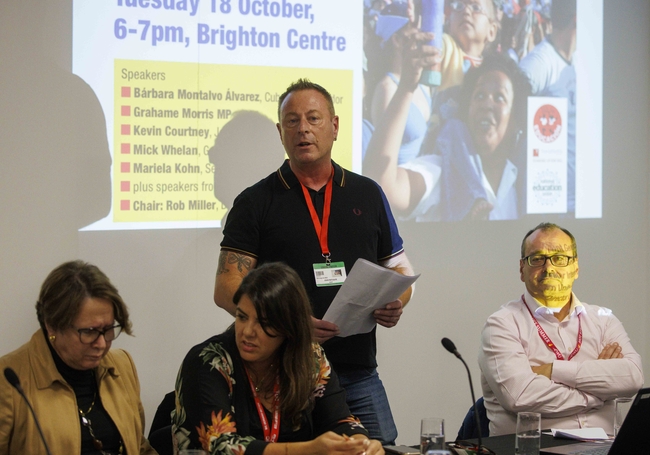
John Metcalfe, ASLEF (photo credit Mark Thomas)
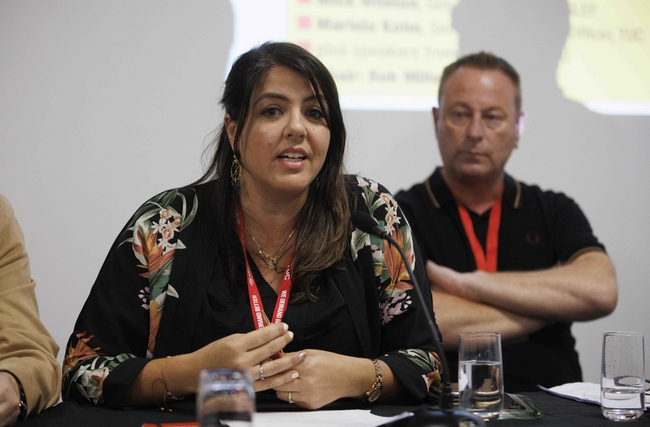
Mariela Kohon, TUC (photo credit Mark Thomas)
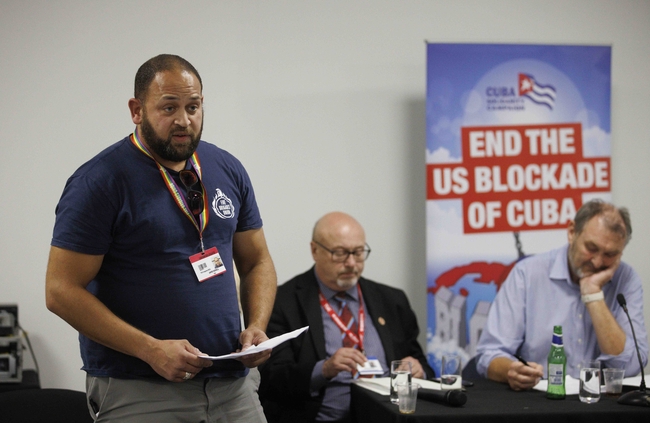
Jamie Newell, FBU (photo credit Mark Thomas)
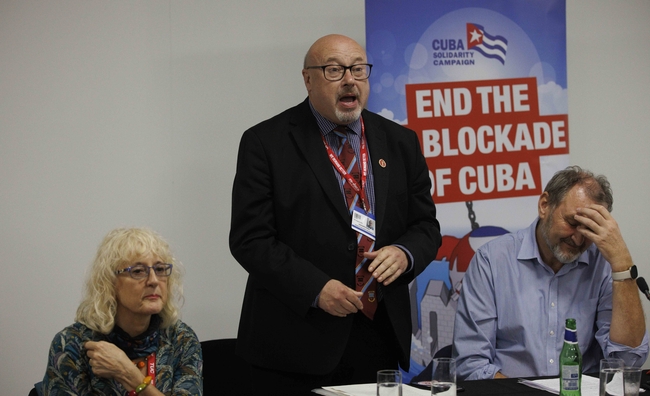
Grahame Morris MP (photo credit Mark Thomas)
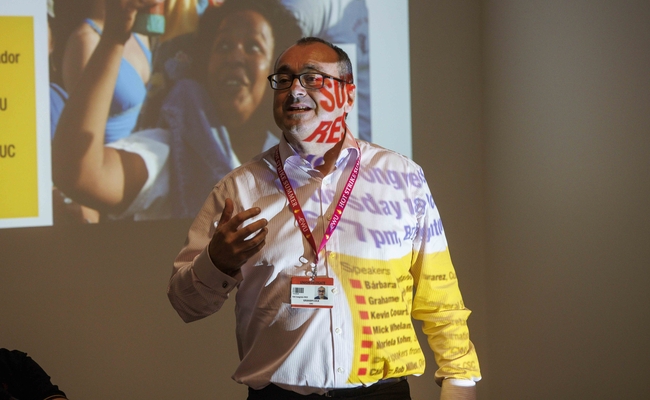
Graham Colk, CWU (photo credit Mark Thomas)
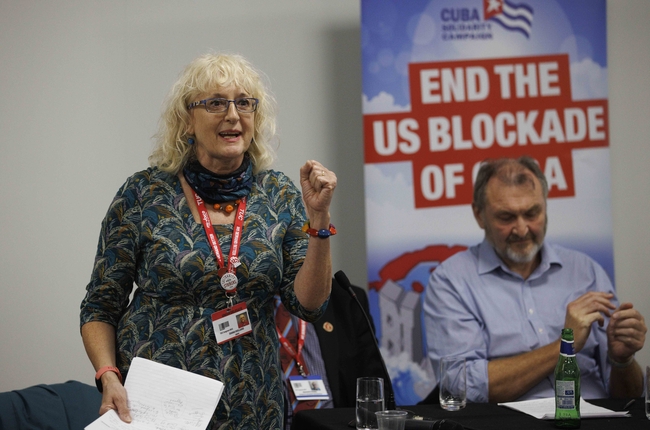
Diana Holland, Unite (photo credit Mark Thomas)
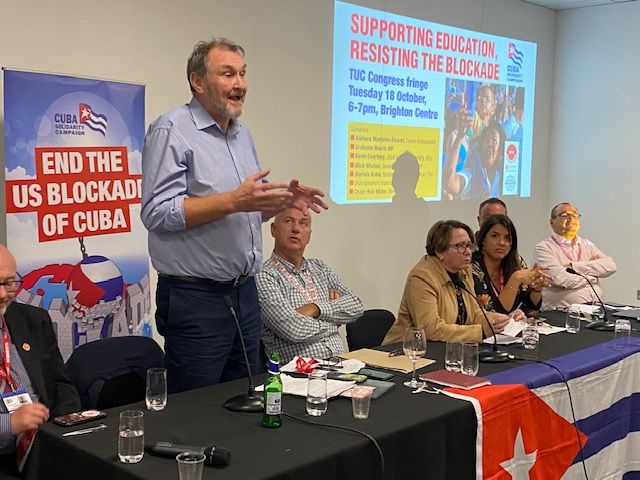
Kevin Courtney, NEU






